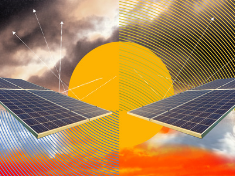-
“An Idea Born of Desperation”: Simon Nicholson on Solar Radiation Management
December 4, 2020 By Cindy Zhou “If solar radiation management were done well—that is, the science is right, the engineering is right, and the policy and governance frameworks around all of the stuff work—then solar radiation management could be a really important, positive contribution to humanity’s responding to climate change,” says Simon Nicholson, associate professor at American University’s School of International Service and co-founder of the Forum for Climate Engineering Assessment in this week’s Friday Podcast interview with ECSP senior advisor and Ohio University professor, Geoff Dabelko. “But, there are all kinds of risks associated with this endeavor.”
“If solar radiation management were done well—that is, the science is right, the engineering is right, and the policy and governance frameworks around all of the stuff work—then solar radiation management could be a really important, positive contribution to humanity’s responding to climate change,” says Simon Nicholson, associate professor at American University’s School of International Service and co-founder of the Forum for Climate Engineering Assessment in this week’s Friday Podcast interview with ECSP senior advisor and Ohio University professor, Geoff Dabelko. “But, there are all kinds of risks associated with this endeavor.”“If solar radiation management were done well—that is, the science is right, the engineering is right, and the policy and governance frameworks around all of the stuff work—then solar radiation management could be a really important, positive contribution to humanity’s responding to climate change,” says Simon Nicholson, associate professor at American University’s School of International Service and co-founder of the Forum for Climate Engineering Assessment in this week’s Friday Podcast interview with ECSP senior advisor and Ohio University professor, Geoff Dabelko. “But, there are all kinds of risks associated with this endeavor.”
Solar radiation management (SRM) denotes a set of ideas about responding to climate change by reflecting solar energy back into space before that energy can be captured by greenhouse gases and cause temperatures to rise. Proposed SRM techniques include stratospheric aerosol injection (introducing reflective particles, like sulphur dioxide, into the stratosphere) and marine cloud brightening.
SRM could enter the scene very quickly, bringing massive and far-reaching implications with them, says Nicholson. “We’re talking about potentially intervening in the climate system in a way that drastically reduces global average temperatures in a very short span of time, which could have massive positive implications, but could also, if mishandled, have massive negative implications.”
Although scientists say it will likely be a couple of decades before SRM technologies are ready to deploy, avoiding the potential downsides of SRM will require anticipatory governance to shape SRM research and manage its deployment. “[I]t’s much better to try and shape something like this on the front end than to respond to it when it’s suddenly in the world,” says Nicholson.
While a coordinated, well-designed international effort is not impossible, it is more likely that SRM initiatives will be more scattered throughout the world, says Nicholson. The Australian Government is already experimenting marine cloud brightening to cool the area around the Great Barrier Reef, which has been severely impacted by higher temperatures. There have also been efforts in the United States to begin outdoor experimentation on stratospheric aerosol injection. Without anticipatory planning that helps to shape the research on solar radiation management and its eventual deployment, people will respond to these experiments as they emerge, says Nicholson, resulting in a “co-creation of a scientific research agenda that’s more expansive, and at the same time, governance apparatus around them.”
SRM has remained on the fringes of conversations about climate change, in part due to concerns that even conversations about its potential might distract politicians from taking action to properly mitigate climate change. Indeed, SRM is no silver bullet, says Nicholson. Solar radiation management only dampens the temperature signal. If greenhouse gases continue to be released into the atmosphere, as soon as you stop the solar radiation management, the warming will continue. “Solar radiation management would be just one small piece, alongside all of the other things that need to be done,” he says.
Even so, SRM research is already underway, and excluding it from climate discussions will not change this, says Nicholson. “Whatever one thinks about solar radiation management as a good or bad idea, the governance challenge still remains.”
Read More:
- In the 21st century, we must consider climate issues in foreign policy.
- How can we apply just war theory to the geoengineering debate?
- Slow-forming sea ice off of Siberia this year points to rapidly rising temperatures in the Arctic.
Friday Podcasts are also available for download on iTunes and Google Podcasts.
Sources: Axios, Forum for Climate Engineering Assessment, Great Barrier Reef Marine Park Authority, Guardian, WUBR
Photo Credit: Kathy Butterfield/Wilson Center, All Rights Reserved.
 A Publication of the Stimson Center.
A Publication of the Stimson Center.

 “If solar radiation management were done well—that is, the science is right, the engineering is right, and the policy and governance frameworks around all of the stuff work—then solar radiation management could be a really important, positive contribution to humanity’s responding to climate change,” says Simon Nicholson, associate professor at American University’s School of International Service and co-founder of the
“If solar radiation management were done well—that is, the science is right, the engineering is right, and the policy and governance frameworks around all of the stuff work—then solar radiation management could be a really important, positive contribution to humanity’s responding to climate change,” says Simon Nicholson, associate professor at American University’s School of International Service and co-founder of the 

